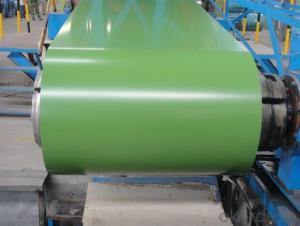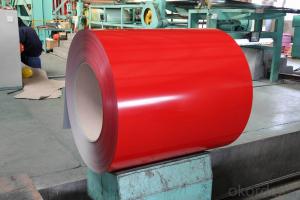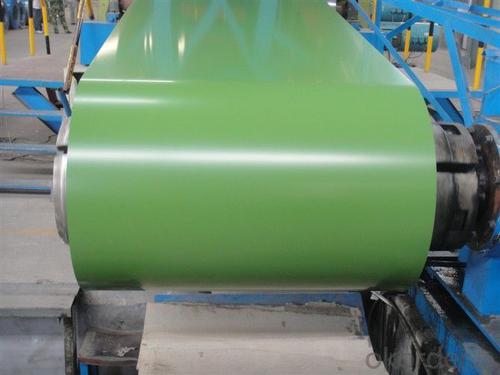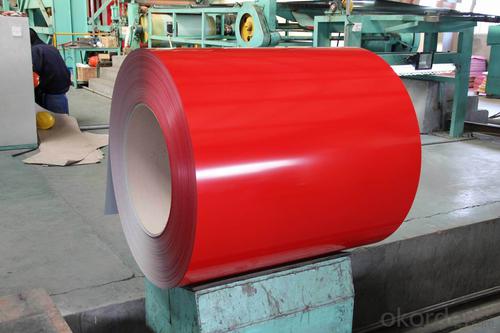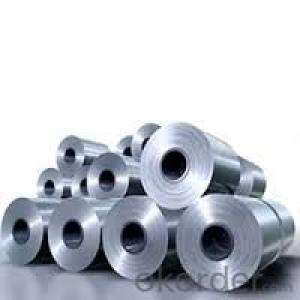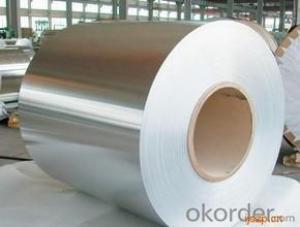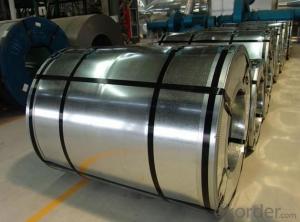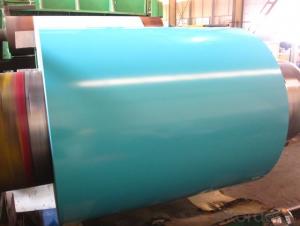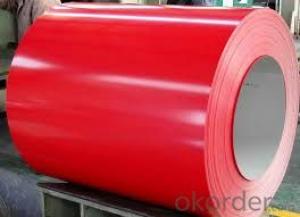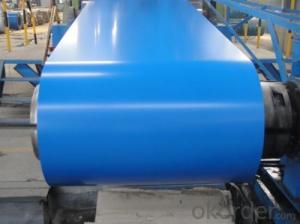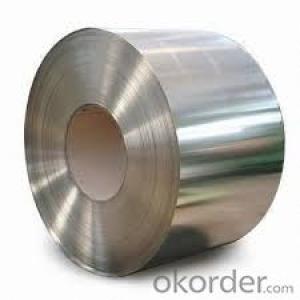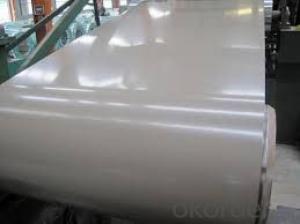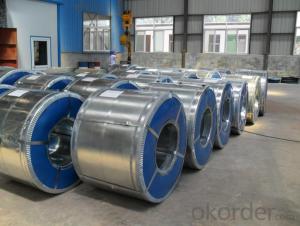Prepainted Hot Dipped Galvanized Steel Coils
- Loading Port:
- Shanghai
- Payment Terms:
- TT OR LC
- Min Order Qty:
- 60 m.t.
- Supply Capability:
- 5000 m.t./month
OKorder Service Pledge
OKorder Financial Service
You Might Also Like
1) AVAILABLE DESIGNATION OF (Prepainted galvanized steel coils) printed PPGI coils
Quality Q/BQB 440-2003 JIS G3312-1994 EN 10326-2004 ASTM A653-02a
EN 10327-2004 (BASE PLATE)
(BASE PLATE)
Commercial Steel TDC51D CGCC DX51D+Z/AZ CS Type A/B/C
Forming Steel (TSt01,TSt02,TSt03) CGCD1 FS Type A, Type B
Drawing TDC52D /TDC53D - DX52D+Z/AZ DDS TYPE A/C
Steel DX53D+Z/AZ
Structural TS280GD(TStE28) CGC400 S280D+Z/AZ SS275
Steel TS350GD(TStE34) CGC440 S350D+Z/AZ SS340 Class1
2) OUR SPECIFICATION OF (Prepainted galvanized steel coils) printed PPGI coils
Available Size:
Manufacturer Thickness Width Length of plate Inner diameter of coil
JIANGSU HUIYE STEEL SHEET CO.,LTD 0.2-1.2mm 800/914/1000/1200/1219/1250mm 1000-6000mm 508mm/610mm
Coated Mass OF (Prepainted galvanized steel coils) printed PPGI coils:
Base plate Available Coated Mass(g/m^2)
Galvanized Steel 80, 100, 120, 160, 180
Galvalume Steel 50, 70, 150
Available Painting OF (Prepainted galvanized steel coils) printed PPGI coils:
Category of Painting Item Code
Polyester PE
High-durability polyester HDP
Silicon modified polyesters SMP
Polyvinylidene fluoride PVDF
Easy-Cleaning —
Painting Thickness Top side: 20+5microns;
Bottom side: 5~7microns.
Color System Produce according to RAL Color System or as per buyer’s color sample.
Painting structure Top surface Bottom surface
Primer coating No coating 1/0
Primer coating Primer coating 1/1
Primer coating + Finish coating No coating 2/0
Primer coating + Finish coating Primer coating or single back coating 2/1
Primer coating + Finish coating Primer coating + Finish back coating 2/2
- Q: What are the different types of steel processing techniques for coils?
- There are several different types of steel processing techniques for coils, including hot rolling, cold rolling, galvanizing, and annealing.
- Q: How are steel coils used in the manufacturing of engine mounts?
- Steel coils are used in the manufacturing of engine mounts to provide structural support and absorb vibrations generated by the engine. The coils are designed to provide tension and flexibility, allowing the engine to be securely mounted while minimizing the transmission of vibrations to the rest of the vehicle.
- Q: What are the different types of steel coil coatings for corrosion resistance?
- There are several different types of steel coil coatings that are specifically designed to provide corrosion resistance. These coatings can be categorized into two main types: organic coatings and metallic coatings. 1. Organic Coatings: - Polyester: Polyester coatings are commonly used for steel coil applications due to their excellent corrosion resistance and durability. They offer good weatherability and resistance to chemicals, making them suitable for outdoor applications. - Polyvinylidene Fluoride (PVDF): PVDF coatings are highly resistant to UV radiation, weathering, and chemicals. They provide exceptional durability and are often used in demanding environments such as coastal areas or industrial settings. - Polyurethane: Polyurethane coatings offer excellent abrasion resistance and provide a high level of corrosion protection. They are commonly used in applications where there is a higher risk of mechanical damage or exposure to harsh conditions. - Epoxy: Epoxy coatings provide excellent adhesion and chemical resistance. They are often used in industrial applications where resistance to chemicals, solvents, and oils is required. 2. Metallic Coatings: - Galvanized Coatings: Galvanized coatings involve applying a layer of zinc to the steel surface through a hot-dip or electroplating process. This creates a barrier between the steel and the surrounding environment, providing effective corrosion protection. Galvanized coatings are widely used in various industries due to their cost-effectiveness and good durability. - Galvannealed Coatings: Galvannealed coatings are similar to galvanized coatings but undergo an additional heat treatment process. This results in a coating with increased hardness and improved paint adhesion, making it suitable for applications that require additional surface protection or paintability. It is important to consider the specific requirements of the application and the level of corrosion resistance needed when selecting the appropriate steel coil coating. Consulting with coating manufacturers or industry experts can help determine the most suitable coating for a particular application.
- Q: How are steel coils used in the manufacturing of storage systems?
- Due to their durability, strength, and versatility, steel coils are an indispensable element in the production of storage systems. Typically made from high-quality steel, these coils are formed by rolling the steel into a coil shape. Within the manufacturing process of storage systems, steel coils serve multiple functions. Primarily, they are utilized in the construction of shelves, racks, and frames. These components offer the necessary structural support to hold and arrange items within the storage system. The robustness of the steel coils guarantees that the storage system can endure heavy loads and maintain stability over time. Furthermore, steel coils are employed in the fabrication of accessories for storage systems, such as brackets, hooks, and dividers. These accessories provide additional functionality and customization options, enabling users to optimize their storage space according to their specific requirements. Moreover, steel coils often serve as the material for doors and panels in storage systems. These coils are molded and shaped to create sturdy and secure doors that offer convenient access to the stored items while maintaining the overall integrity of the system. These doors can be designed with various locking mechanisms to enhance security and prevent unauthorized access. Additionally, steel coils are crucial in the production of mobile storage systems. These systems, such as mobile shelving units or compactors, are designed to maximize storage capacity in limited space. The flexibility and versatility of steel coils allow for the creation of movable components that can be easily adjusted and reconfigured to accommodate changing storage requirements. In summary, steel coils play a vital role in the manufacturing of storage systems, providing the necessary strength, durability, and versatility required for these structures. Whether utilized for shelves, accessories, doors, or mobile systems, steel coils ensure that storage systems are reliable, secure, and efficient in organizing and storing various items.
- Q: I want to build an indoor riding arena, should I go for Steel ones.
- Though okorder /.. You can also have a look!!
- Q: How are steel coils processed for cold rolling or hot rolling?
- Steel coils are processed for cold rolling or hot rolling through a series of steps. For cold rolling, the steel coils are first cleaned and pickled to remove any impurities. They are then passed through a series of rolling mills, where the steel is gradually reduced in thickness and elongated. This process improves the steel's strength and surface finish. In contrast, for hot rolling, the steel coils are heated to high temperatures and then passed through a series of rolling mills. The hot rolling process allows for greater deformability and shaping of the steel, resulting in different thicknesses and shapes.
- Q: for instance Cr-Ni steeldoes this refer to plated steel or a uniform mixture
- stainless steel is an alloy normally iron with additions of C, Mn, Ni, Cr, and Nb - amounts added depend on properties required. Corrosion resistance is due to a very thin but dense layer of chromium oxide which forms at the surface and prevents further attack. Ordinary steel on the other hand becomes coated with a porous layer of iron oxide(rust) through which the atmosphere can pass and cause further corrosion.
- Q: Can one assume that stainless steel that can be hardened is magnetic?
- Most of the 300 series stainless metals are not magnetic, but if it is cast, it is magnetic. Welds are considered casting, so the welds are magnetic even though the items that are welded together are not. The 400 series stainless may have a few types that are magnetic. I suppose generally the hardenable factor has a bearing if you consider that 400 series can be hardened more readily than the 300 series. Source: Working in metal fabrication shops.
- Q: I have taylormade burner steel irons and I was wondering what would the flex of steel be if you were to compare it to graphite shafts, like regular, stiff, super stiff, etc...THANKS!!!!!!!!!!!!!!!!!!!!!!!!!!!!!!!!!!!!!!
- If i understand you correctly, i think you misunderstand shafts. Steel shafts vs. graphite shafts these days is more of a competition of weights, not flexibility. Both steel and Graphite have different flex profiles available from Ladies (L) to super stiff (X). Graphite may feel a little more whippy than steel because of the lighter weight. Shafts will vary by company as well. Stiff from True temper may not be as stiff as one from Aldila, or vice verse. You can also make a shaft play stiffer or more flexible by where you cut the length. This is called tipping. Take more from the bottom and it will be stiffer, more from the grip end and it will play more flexible.
- Q: What are the common coil coating materials?
- The common coil coating materials include polyester, polyvinylidene fluoride (PVDF), polyurethane, epoxy, and acrylic.
Send your message to us
Prepainted Hot Dipped Galvanized Steel Coils
- Loading Port:
- Shanghai
- Payment Terms:
- TT OR LC
- Min Order Qty:
- 60 m.t.
- Supply Capability:
- 5000 m.t./month
OKorder Service Pledge
OKorder Financial Service
Similar products
Hot products
Hot Searches
Related keywords
